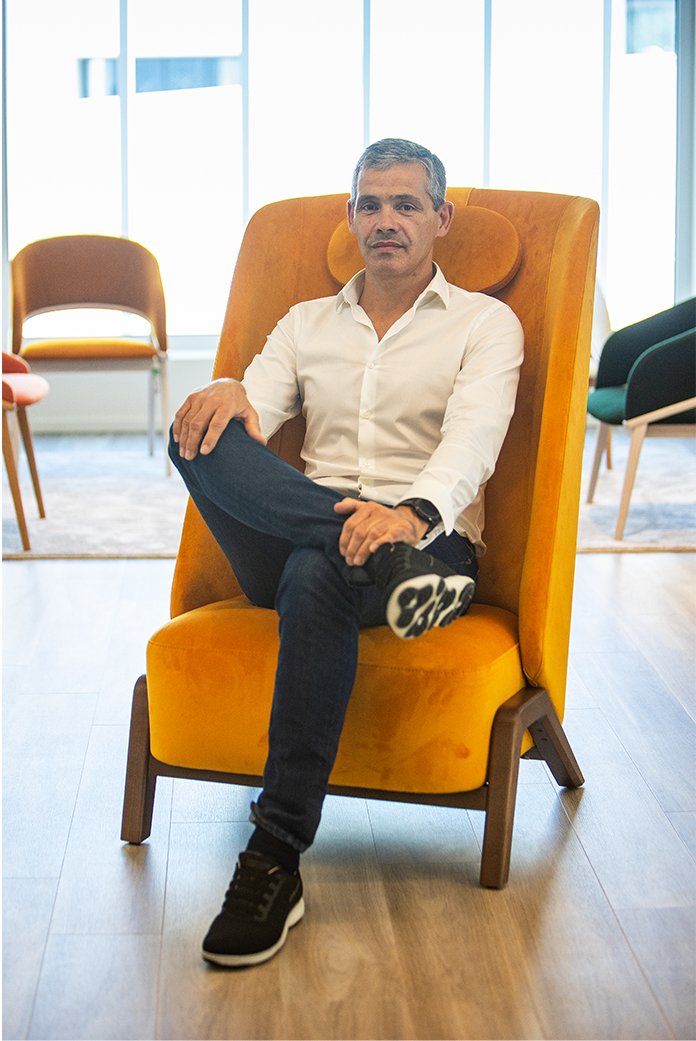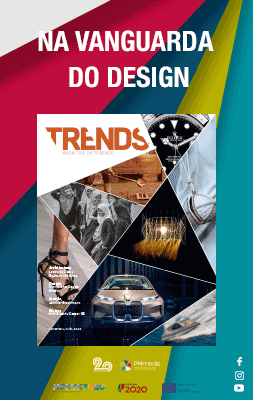
Hardly anything prospers without dedication and love. Perhaps this is why the success of Portuguese chair manufacturer Fenabel can be better understood. The company, which turns 30 this year, came into being through a curious story that brought Mário Leite’s grandparents together. However, if today the company is an international success, it is due to the efforts of their grandson, whose goals are well defined: striving to be a standout company; continuing to move towards Industry 4.0; and, quite naturally, contributing every day to preserving the sustainability of the planet.
How did Fenabel come about?
We divide the story into two parts. The first intertwines with our family history. My great-grandparents had been producing chairs since 1907. Both my maternal and paternal great-grandfather had small chair making workshops. They were neighbours and competitors and, at a certain moment, the lives of these two men crossed paths, thanks to the marriage of their children Rosa Dias and Mário Leite. After years of work, my father, whose name was also Mário Leite, created this company. To begin with, it was dealt in chairs, then furniture in general, and in 1991 we went back again to just chairs.
In 1992, the Fenabel brand was created. We started in August, but my father passed away in February of the following year, which forced us to rethink and readapt, but always with innovation and growth in mind. We wanted to grow in Portugal, but we were already exporters to markets such as Spain and the Netherlands. And so, we kept working, hard and always with great diligence, and the international market began to take on a more important role. From early on Fenabel would appear at international fairs, in particular in Cologne, Valencia, Paris, United Kingdom, Las Vegas and, mainly, in Milan, where, even today, we invest heavily in the presentation of new collections, because we consider this is the main fair of the sector. We are 30 years old and we are already a high-profile company, with experience and know-how, which is beginning to be a benchmark in the world of chairs.
Why did you specialise in chairs?
Within the world of furniture, companies specialise in different things. We focus on wooden chairs because they require their own working mechanisms. It is a different market. A chair can be in the living room, in the kitchen, but also in a restaurant and hotel, and in addition to chairs, we also have proposals for lounges, sofas and tables, all to complement the ‘chair’ product and to equip a hotel with regard to seating products. This is, in fact, a wide-ranging area. In the last few years, we have also started to work in the geriatric area, for nursing homes, which is also a market where we have invested a great deal. Basically, specialisation is due to the need for specific machines, but also because there is a market just for chairs and for tables.
At the moment the company, which has new facilities in Rebordosa, Paredes (Portugal), has a large team...
Yes, we have 123 employees.
«We are 30 years old and we are already a high-profile company, with experience and know-how»
Earlier you spoke of the strong investment in exports. Who are your main customers at the moment?
Our main market is France. Then we have Germany, the United Kingdom, Canada, the United States, New Zealand, Australia, Spain, the Benelux countries, etc. among many others... The truth is that we sell a little all over the world, but our strongest presence is in Europe, because of the proximity and ease of selling.
Fenabel is a ‘PME de Excelência’ [Exceptional SME]. How is your relationship with the Portuguese market?
Yes, we have been ‘PME de Excelência’ for five consecutive years. We export around 87% of our products and the other 13% are for Portuguese companies that also sell Fenabel products abroad. Although the Portuguese market is not very expressive, it represents about 5% of the material we produce. The market has changed a lot in recent years, but what we have done is to invest in design and innovation, with good design studios, while we are also always ready to enter into partnerships with institutions, such as the ESAD College of Art and Design, and in design contests. What I believe has made the company what it is, apart from its commitment to continuous improvement, is the team, to which I am very grateful.
In general terms, how does Fenabel stand out as a successful brand?
For a few years now we have forged partnerships with Portuguese and international designers, such as Gian Luca Tonneli and Davide Carlesi, from Area44, in Italy; Aitor Garcia de Vicuña and MUKA lab, from Spain; Studio Segers, from Belgium; Javier Gomez, from the USA; and also, Portuguese designers, such as Mónica Braga dos Santos, André Teoman, among others.
We want to be different and innovative. We have been compiling a catalogue of products that differs from the rest of the market, combining comfort and quality. We have invested in our facilities and greatly improved the working conditions of our employees, which was something we had wanted to do for a long time. And, at the moment, we are in another investment phase, in top equipment, which will allow us to be even more efficient and continue to ensure the quality of construction of the pieces that we are already known for.
«We have a photovoltaic plant that allows us to produce 40% of the energy we use»
In August the company will turn 30. What are the goals you are starting to outline?
Basically, there are four and they are all interconnected. Fenabel’s first goal, which we have been delivering every day, is to be a benchmark in the world of chairs, further consolidating the strong position in today’s markets and extending even further the number of countries where we are present. Then, we want to be an Industry 4.0, even more versatile, so that our customers can follow and integrate the production process. We are already Taylor Made and Customer Made, which allows us the flexibility sought by our customers. Another issue is the circular economy, which is being talked about a lot these days and where we have also taken many steps by being a certified company for many years. And this year we obtained environmental certification, as we are a company that environmentally controls everything it produces. Several factors contribute to this, such as the use of PEFC wood from controlled forests; the full reuse of production surpluses; care taken in working with water-based finished components; the use of recycled fabrics in partnerships with NGOs; investment in solar panels –we have a photovoltaic plant that allows us to produce 40% of the energy we use –, among many other factors. We want to control our product as much as possible, but also by making our customer aware of good practice, and this has to start with us.
As I said, we want to improve every day.









